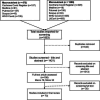A scoping review: the impact of nutritional status on the efficacy, effectiveness, and immunogenicity of COVID-19 vaccines
- PMID: 40660410
- PMCID: PMC12261628
- DOI: 10.1186/s40794-025-00258-z
A scoping review: the impact of nutritional status on the efficacy, effectiveness, and immunogenicity of COVID-19 vaccines
Abstract
Background: Vaccination is one of the most effective strategies in mitigating the severity of SARS-CoV-2 infection. While a connection between poor nutritional status and diminished immune responses to vaccination has been noted, comprehensive reviews elucidating this association have been scarce. To address this gap, we conducted a scoping review to characterise the relationship between nutritional status (specifically, body mass index (BMI) or micronutrient deficiencies) and the responses to COVID-19 vaccination, encompassing efficacy, effectiveness, and immunogenicity.
Method: We searched PubMed, OVID-Medline, Scopus, Cochrane Covid Register, LitCovid, and WHO COVID-19 research databases for studies that reported the association between nutritional status and responses to the COVID-19 vaccines (published between December 20, 2019, and December 30, 2023). Two reviewers independently screened the articles, and disagreements were resolved through consensus or by a third reviewer.
Results: Seventy-three out of 1,853 identified articles were included in this review, predominantly featuring cohort designs (72%). Among these studies, 63% reported BMI, 30% focused on micronutrients (specifically vitamin D, selenium, iron, zinc), and 6% examined both. Most studies (84%) focused on vaccine immunogenicity. The most frequently studied vaccines were BNT162b2 (Pfizer, 74%), ChAdOx (AstraZeneca, 23%), and mRNA-1273 (Moderna, 14%). High BMI significantly reduced COVID-19 vaccine immunogenicity in 23 studies, while adequate vitamin D was associated with increased vaccine response in seven studies.
Conclusion: Overnutrition and micronutrient deficiencies (vitamin D, iron, selenium and zinc) have been observed to attenuate the potency of COVID-19 vaccines. Future strategies aimed at prioritizing vaccination in obese and overweight individuals, or enhancing their vaccine response, may involve identifying measures such as the provision of booster doses. Additionally, efforts should ensure micronutrient adequacy, including improving vitamin D status through strategies like increased sun exposure or supplementation, particularly for deficient individuals.
Keywords: BMI; COVID-19; Immune response; Obesity; Vaccines; Vitamin D.
© 2025. The Author(s).
Conflict of interest statement
Declarations. Ethics approval and consent to participate: Not required. Consent for publication: Not applicable. Competing interests: The authors declare no competing interests.
Similar articles
-
Efficacy and safety of COVID-19 vaccines.Cochrane Database Syst Rev. 2022 Dec 7;12(12):CD015477. doi: 10.1002/14651858.CD015477. Cochrane Database Syst Rev. 2022. PMID: 36473651 Free PMC article.
-
Immunogenicity and seroefficacy of pneumococcal conjugate vaccines: a systematic review and network meta-analysis.Health Technol Assess. 2024 Jul;28(34):1-109. doi: 10.3310/YWHA3079. Health Technol Assess. 2024. PMID: 39046101 Free PMC article.
-
Signs and symptoms to determine if a patient presenting in primary care or hospital outpatient settings has COVID-19.Cochrane Database Syst Rev. 2022 May 20;5(5):CD013665. doi: 10.1002/14651858.CD013665.pub3. Cochrane Database Syst Rev. 2022. PMID: 35593186 Free PMC article.
-
Micronutrient supplementation in pregnant women with HIV infection.Cochrane Database Syst Rev. 2012 Mar 14;2012(3):CD009755. doi: 10.1002/14651858.CD009755. Cochrane Database Syst Rev. 2012. PMID: 22419344 Free PMC article.
-
The effectiveness of interventions to treat severe acute malnutrition in young children: a systematic review.Health Technol Assess. 2012;16(19):1-316. doi: 10.3310/hta16190. Health Technol Assess. 2012. PMID: 22480797 Free PMC article.
References
-
- WHO. WHO Coronavirus (COVID-19) Dashboard. WHO Coronavirus (COVID-19) Dashboard. 2022.
-
- World Bank Group. Chapter 1. The economic impacts of the COVID-19 crisis. World Bank Group. 2022. Available from: https://www.worldbank.org/en/publication/wdr2022/brief/chapter-1-introdu.... Cited 2022 Dec 3.
-
- Lipsitch BM, Dean NE. Viral shedding are important for protection. Science. 2020;370(6518):763–6. - PubMed
Publication types
Grants and funding
- 1570/UNI/DITLIT/Dit-Lit/PT.01.03/2022/Universitas Gadjah Mada
- 1570/UNI/DITLIT/Dit-Lit/PT.01.03/2022/Universitas Gadjah Mada
- 1570/UNI/DITLIT/Dit-Lit/PT.01.03/2022/Universitas Gadjah Mada
- 1570/UNI/DITLIT/Dit-Lit/PT.01.03/2022/Universitas Gadjah Mada
- 1570/UNI/DITLIT/Dit-Lit/PT.01.03/2022/Universitas Gadjah Mada
LinkOut - more resources
Full Text Sources
Miscellaneous


